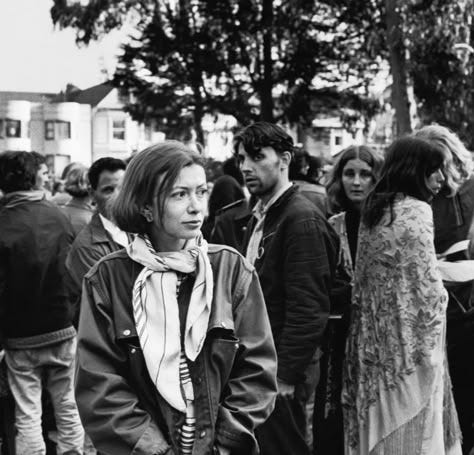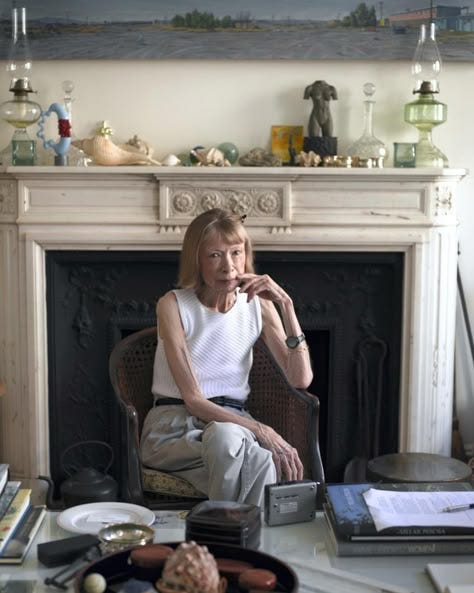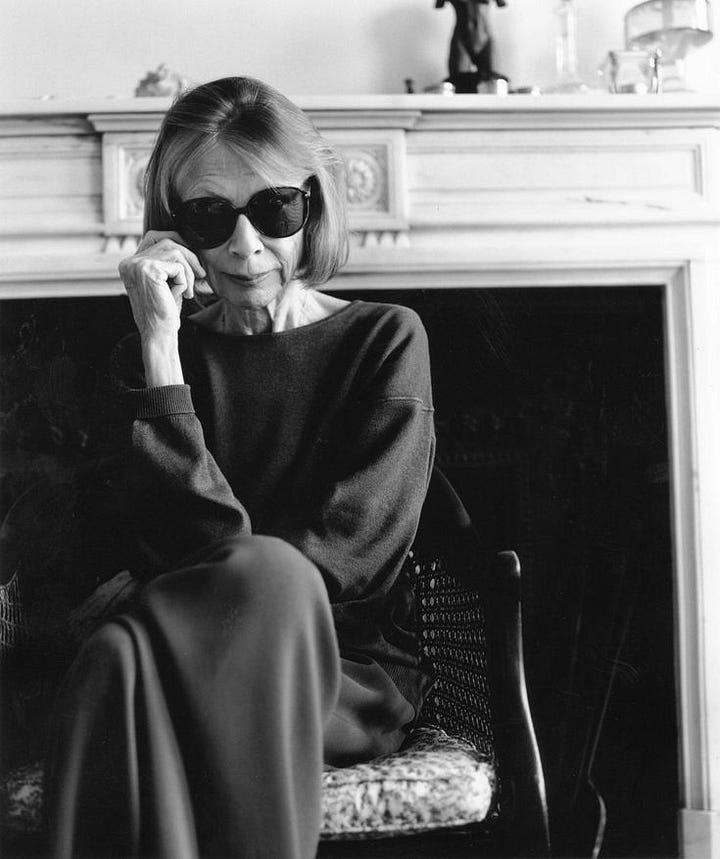Joan Didion, the master of cool detachment and unflinching observation, is now the subject of the same scrutiny she once wielded like a scalpel. Rumor has it, Didion’s diaries are set to publish - the utmost posthumous betrayal. An excavation of a mind that for all its literary transparency remained fundamentally opaque.
Didion curated her own mystique, allowing us to steal glimpses behind the satin veil. A thin frame in oversized sunglasses. A cigarette balanced between two delicate fingers. The quiet clink of ice in a Coca-Cola glass on a crisp morning. She offered only fragments, silhouettes, omissions in place of confession. To read her was to witness a woman perpetually keeping herself at arm’s length even as she dissected the world with forensic precision.
Yet here we are, prying open locked drawers and rifling through the margins1. Because as readers, we believe we are owed something.
“In December 1999, Joan Didion started writing a journal after sessions with her psychiatrist. Her notes discussed her struggles with anxiety, guilt and depression, her strained relationship with her daughter, and her thoughts about her work and legacy. Shortly after Didion’s death in 2021, her literary trustees found the diary while going through papers in her Manhattan apartment. There were 46 entries stashed in an unlabeled folder and addressed to her husband, John Gregory Dunne. Didion left no instructions about how to handle the journal after her death, and no one in her professional orbit knew of its existence.”
- ny times
The boundary between public and private dissolves the moment a person is deemed important enough to warrant excavation. Didion chronicled the unraveling of American myths only to become one herself.
I shove my diary into a drawer, buried under lace and lingerie. The pages are filled with self-censorship, redactions, and code names. All desperate attempts at privacy, even from myself. The fear of being known too well and having my rawest self dissected and judged keeps me from ever writing freely. Did Didion ever anticipate the red carpet reveal of her darkest divulgences?


Didion was elusive even in her sharpest reportage. She built her career on peering into the lives of others by slipping through the cracks of their grief, their unraveling, their contradictions. The ultimate irony is that Didion was a journalist who understood (perhaps more than anyone) the human compulsion to pull back the veil. And now, the tables have turned.
Didion knew better than most that to be understood is to be diminished, that mystery is power. She understood that a well-cut dress could be its own kind of armor. But what more do we truly know?
Didion built an entire mythology out of restraint. But restraint does not satisfy hunger. Readers want flesh, they scavenge. They pick apart her remains, tearing at every last word, searching for some final revelation, some unguarded moment, some proof that she was not so unknowable after all.
I am no better. I will buy the book. I will devour every page. I will tell myself it is for the prose, for the insight, for the love of her mind. But beneath that is something darker. The same voyeuristic impulse Didion understood so well. The same hunger to know, to see, to claim some piece of her that was never meant for me.
The final lesson Didion leaves us: we are all vultures in the end.


As a law student I can say: Upon Joan Didion’s death, the rights to her unpublished writings became part of her literary estate. Her estate is assigned to and managed by her brother’s children. Under U.S. copyright and estate law, unless an author explicitly prohibits posthumous publication, heirs or estate managers have the legal authority to publish such materials. Didion left no known legal restriction on her diaries, and the organized state of the writings could arguably suggest she may have anticipated their eventual release. For these reasons, this is not a legal discourse but an ethical one.





